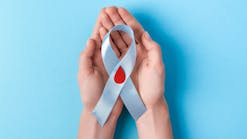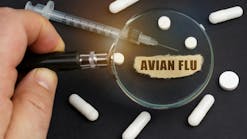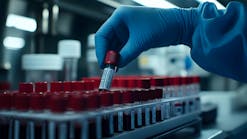… I believe laboratory medicine is at the heart of medical decision making and contributes
a great deal to patient care every day.
Kandice Kottke-Marchant,
MD, PhD
Professional
Chair, PLMI, Cleveland Clinic;
professor and chair, Department of Pathology,
Cleveland Clinic Lerner College of Medicine;
adjunct professor, Department of Biomedical Engineering,
Case Western Reserve University.
Education
PhD, Macromolecular Science, and MD
Case Western Reserve University, Cleveland, OH;
BS, Biochemistry and Biomedical Engineering
Northwestern University, Chicago.
Personal
Married to Dr. Roger Marchant, professor, Biomedical Engineering,
Case Western Reserve University,
with two adult daughters;
member of board of trustees, Opera Cleveland;
hobbies include traveling, international cooking, and cheese making.
Past leads to passion. When I was 16 years old, my father, a cardiologist, arranged for me to observe a hip-replacement surgery where the surgeon also tried to retrieve a bullet that had been lodged in the patient's thigh since the Korean War. I also worked as an electrocardiogram technician in high school. Once, when I was performing an EKG, the patient went into cardiac arrest. I quickly called for help, but the patient was not able to be resuscitated and died. Those events made me want to enter the medical field. I entered pathology and laboratory medicine because I believe laboratory medicine is at the heart of medical decision making and contributes a great deal to patient care every day.
Current challenges. The Pathology and Laboratory Medicine Institute's (PLMI) commercial extension — Cleveland Clinic Laboratories — has been providing outreach services and reference laboratory testing for more than 25 years. Currently, we offer a menu of more than 2,400 routine and esoteric tests. We process more than 15,000 specimens a day and perform more than 12 million tests annually for both hospital and outreach patients. One of the challenges in providing excellent laboratory-based patient care with a system that has such a large testing volume is maintaining a thorough specimen and courier tracking-management system. By doing so, lost sample rates decrease while turnaround times increase. We provide the highest quality laboratory testing and expert pathology diagnosis to patients institutionally, regionally, and nationally through a combination of teamwork, a comprehensive quality-management plan, and a robust continuous-improvement effort.
Future of laboratory medicine. Today, there is a focus on test-result meaning versus numbers. Most pathologists now strive to be consultants and specialists who provide the expert diagnosis, second opinions, and subspecialty consultation that are the bases for effective patient care. I foresee comprehensive molecular genetic testing — especially in pharmacogenomics and biomarkers — becoming involved in clinical decision making for drug therapy for a wide range of disorders from hypertension, to depression, to malignancy. The most important breakthrough in the next five to 10 years will be harnessing complex genetic- and genomic-testing data to provide useful clinical diagnostic and prognostic information.
Tomorrow's healthcare team. We offer educational programs for medical technologists, medical laboratory technicians, pathology assistants, phlebotomists, histotechnologists, and cytotechnologists. We are dedicated to serving the city of Cleveland and the surrounding areas by providing a broad range of advanced training programs to those interested in pursuing careers in allied health. We also offer postgraduate pathology training, continued-education programs, and annual symposia. Children typically associate a career in medicine with being a doctor or nurse. Our Institute takes an active role in trying to change that view in primary and secondary schools through civic education. In partnership with area schools, local businesses, and non-profit organizations, the Cleveland Clinic's Office of Civic Education creates innovative programs designed to enhance children's education. We also advocate entry of college graduates into the field through training programs in medical technology and the pathology-assistant program, and we currently offer students two scholarship opportunities.





